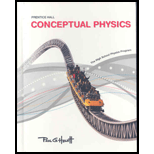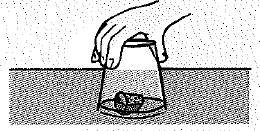
Concept explainers
Try this in the bathtub or while washing dishes. Lower a glass, mouth downward, over a small floating object as shown. What happens? How deep would the glass have to be pushed to compress the enclosed air to, half its volume? (Hint: You can’t do this in your bathtub unless it’s 10.3 m deep!)

To explain: The effect if a glass is lowered down over a floating object.
To find: The depth at which the glass should be pushed in order to compress the enclosed air.
Answer to Problem 66A
If glass is lowered down then air pocket shrinks.
Glass should be push double of its height to compress the air to half of its volume that time
Explanation of Solution
Introduction:
Buoyant force:The force exerted by water or any liquid .
When the glass is pushed downward over a floating object in water that at time air pocket shrinks. Air present in glass will put force on water and pressure on glass will increases due to which it is difficult to push it downward .
Consider
Height of glass = H
When air is compressed to half of its volume that time
Density of water= 2ρ
Density of air = ρ
By pascals law,
So glass should be push double of its height to compress the air to half of its volume that time.
Chapter 20 Solutions
Conceptual Physics: The High School Physics Program
Additional Science Textbook Solutions
University Physics with Modern Physics (14th Edition)
Physics for Scientists and Engineers: A Strategic Approach, Vol. 1 (Chs 1-21) (4th Edition)
Physics: Principles with Applications
Conceptual Integrated Science
Physics for Scientists and Engineers with Modern Physics
The Cosmic Perspective (8th Edition)
 College PhysicsPhysicsISBN:9781305952300Author:Raymond A. Serway, Chris VuillePublisher:Cengage Learning
College PhysicsPhysicsISBN:9781305952300Author:Raymond A. Serway, Chris VuillePublisher:Cengage Learning University Physics (14th Edition)PhysicsISBN:9780133969290Author:Hugh D. Young, Roger A. FreedmanPublisher:PEARSON
University Physics (14th Edition)PhysicsISBN:9780133969290Author:Hugh D. Young, Roger A. FreedmanPublisher:PEARSON Introduction To Quantum MechanicsPhysicsISBN:9781107189638Author:Griffiths, David J., Schroeter, Darrell F.Publisher:Cambridge University Press
Introduction To Quantum MechanicsPhysicsISBN:9781107189638Author:Griffiths, David J., Schroeter, Darrell F.Publisher:Cambridge University Press Physics for Scientists and EngineersPhysicsISBN:9781337553278Author:Raymond A. Serway, John W. JewettPublisher:Cengage Learning
Physics for Scientists and EngineersPhysicsISBN:9781337553278Author:Raymond A. Serway, John W. JewettPublisher:Cengage Learning Lecture- Tutorials for Introductory AstronomyPhysicsISBN:9780321820464Author:Edward E. Prather, Tim P. Slater, Jeff P. Adams, Gina BrissendenPublisher:Addison-Wesley
Lecture- Tutorials for Introductory AstronomyPhysicsISBN:9780321820464Author:Edward E. Prather, Tim P. Slater, Jeff P. Adams, Gina BrissendenPublisher:Addison-Wesley College Physics: A Strategic Approach (4th Editio...PhysicsISBN:9780134609034Author:Randall D. Knight (Professor Emeritus), Brian Jones, Stuart FieldPublisher:PEARSON
College Physics: A Strategic Approach (4th Editio...PhysicsISBN:9780134609034Author:Randall D. Knight (Professor Emeritus), Brian Jones, Stuart FieldPublisher:PEARSON





